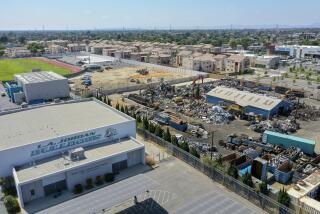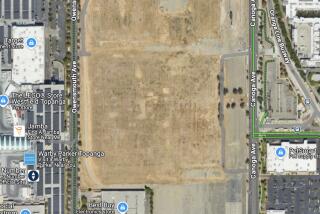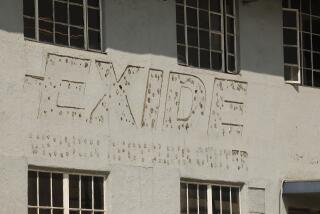Arsenic emissions from Vernon firm Exide pose âchronic hazardâ
More than 250,000 people living in a broad swath of eastern Los Angeles, Boyle Heights, Huntington Park and other southeast cities face a âchronic hazardâ from exposure to arsenic emissions from a Vernon battery recycler, according to air district officials.
Toxic emissions from the Exide Technologies plant have the potential to create âneurological changes, specifically a decrease in intellectual function in children,â said Jean Ospital, health effects officer for the South Coast Air Quality Management District.
He stressed that there is no evidence indicating such a large number of people have been harmed; the health risk assessment shows only that they could be.
Regulators have been wrestling with what to do about Exide since a health-risk report released in the spring showed that elevated arsenic emissions from the plant were posing an increased cancer risk to more than 110,000 people.
A little-noticed portion of the same report mentioned the risk of chronic hazards, which is separate from the cancer risk, could affect as many as 252,000 people. But the information was not highlighted in public hearings or testimony before elected officials and thus caught many people by surprise when a Times reporter asked about the finding this week.
âWow, thatâs horrible,â Maywood City Councilman Felipe Aguirre said. âHow is this affecting our children? I want them to do a study ⦠on the young children in our community.â
âIt seems incredible that this company has [potentially] done this much damage,â Aguirre said.
Exide officials could not be reached for comment on Thursday. In the past, company officials have said that Exideâs arsenic emissions have been reduced by more than 70% since 2010, when the high emissions that triggered the requirements for a health-risk assessment were recorded.
In April, shortly after the elevated cancer risk was reported, officials with the state Department of Toxic Substances Control sought to suspend operations at the Exide plant.
But Exide, which filed for bankruptcy protection earlier this summer, appealed in Los Angeles County Superior Court, arguing that it did not pose âan imminent and substantialâ danger to the public and that regulators were acting capriciously under public and political pressure. A judge sided with the company, saying it could resume operations.
Last month, the company began testing dust and soil in the neighborhood around its plant to determine whether dangerous metals have accumulated and pose an additional health risk to the community. In the past, regulators have found that lead dust from the plant had sprinkled down on neighboring rooftops and streets.
Times staff writer Kim Christensen contributed to this report.
More to Read
Sign up for Essential California
The most important California stories and recommendations in your inbox every morning.
You may occasionally receive promotional content from the Los Angeles Times.










